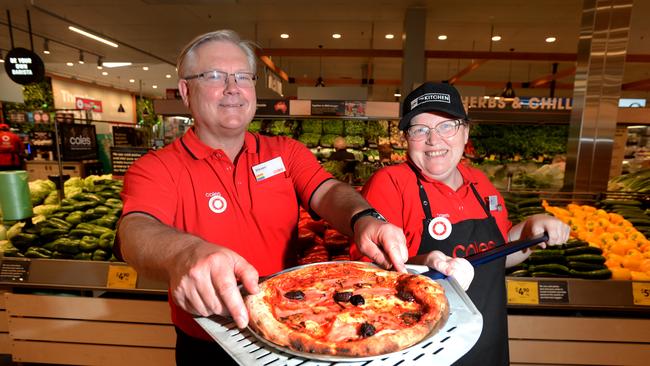Coles CEO Steven Cain warns rising rate, plus food and grocery inflation could pinch some household budgets
Supermarket boss Steven Cain has warned a string of interest rate rises on top of strong food and grocery inflation may hurt household spending.

The boss of Australia’s second largest supermarket chain Coles has warned a string of interest rate rises on top of strong food and grocery inflation could hurt some households and see them cut back on spending.
Steven Cain said the federal government’s recent announcement in the federal budget of a halving in the fuel excise for six months was a “little bit of good news”, but that “a lot” of costs were still pummeling suppliers and manufacturers to generate ongoing inflationary pressures for businesses and consumers.
While the shortage of wooden pallets used to transport goods that emerged last year had started to improve suppliers were still struggling with steeper raw commodity prices, elevated energy bills and higher shipping charges - all of which was feeding inflation.
“If you listen to what is going on with the election, it (inflation) is touted by many as being the most important thing on people‘s minds and obviously if interest rates start to rise on top of inflation, then, there’s going to be a part of the population that is going to be impacted - and will need to sort of cut back on things,” Mr Cain said.
Mr Cain added in an interview on Wednesday after unveiling a new range of homebrand carbon neutral beef for Coles stores that the supermarket remained in discussions with food and grocery suppliers over their cost pressures, but that with “shoppers top of mind” Coles would strive to deliver value for money.
With official interest rates set to begin a round of tightening as early as next month if the Reserve Bank decides to act it could see mortgage rates for homeowners rise sharply from an historically low base, adding further stress on household budgets at a time when the cost of living is also on the march.
Mr Cain said rising prices for food and groceries was now “well understood in the market” and that much of this was springing from higher costs for producers driven by issues such as supply chain disruptions, higher energy prices and labour shortages.
“I think it is well understood in the market that there is a lot of cost price inflation hitting the supply base, probably the fuel price (reduction) is a little bit of good news for people even if it turns out to be a temporary reduction in taxes.
“But other than that, there‘s still a lot of pressure on suppliers, particularly around raw ingredients, shipping and transport, energy in general and so on. So obviously we are in discussions with them all to see how we can help in the process.

“But also with shoppers top of mind as well in terms of making sure that we deliver trusted value and that certainly we spend as much time talking about that in the support centres as we do about prices, what prices need to change and so on.”
Woolworths boss Brad Banducci earlier this year said inflation was “alive and real” across the supermarket aisle.
A recent report from investment bank UBS found that food inflation had accelerated since the beginning of the year, led by higher fresh food and meat as well as other packaged groceries.
The UBS report said for Woolworths March quarter prices rose 4.3 per cent, a large leap from 1.4 per cent in the previous quarter, while inflation at Coles was up 3.2 per cent against 1 per cent in the second quarter.
The Australian Food and Grocery Council said this week that their manufacturer and supplier members were facing increases in costs of up to 700 per cent since the pandemic began and have warned some of that will flow through to the price shoppers pay at the checkout.
The cost of implementing Covid safety requirements at factories, sourcing ingredients, the global shortage of wooden pallets used to ship finished goods and skyrocketing freight costs are all playing into food inflation.



